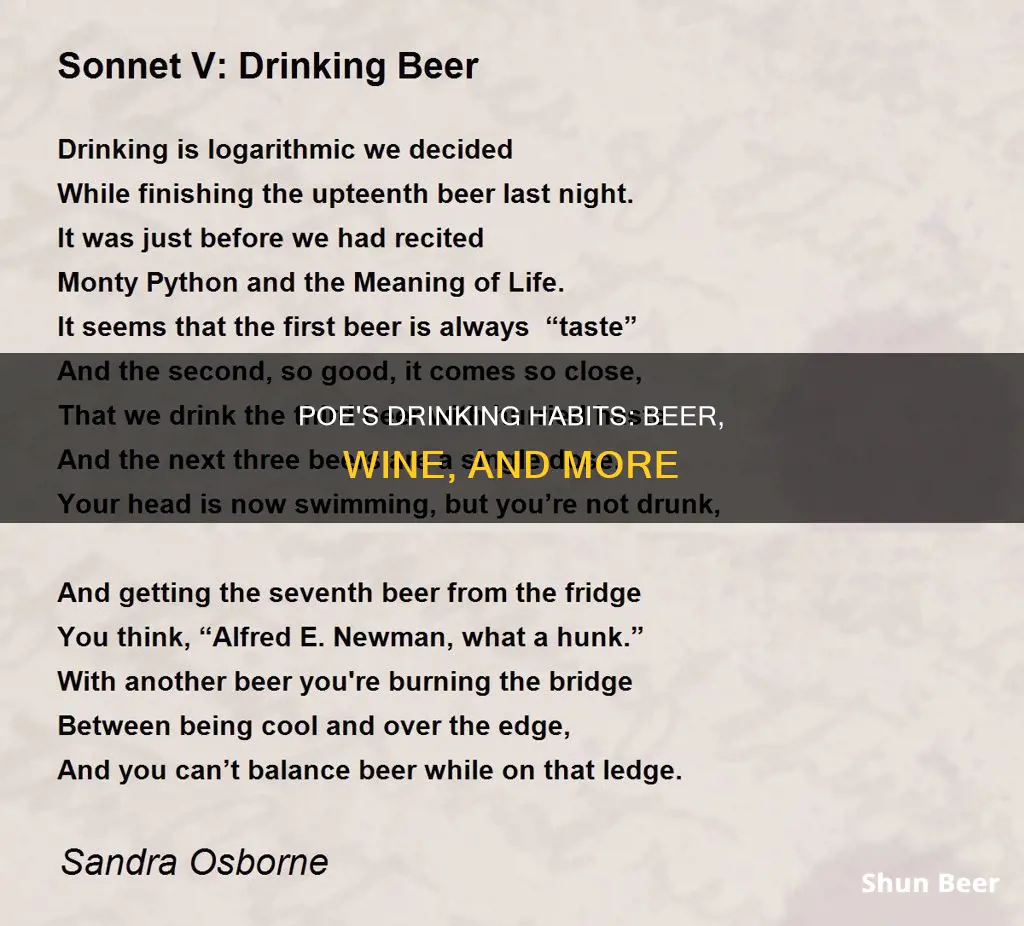
Edgar Allan Poe's death in 1849 remains one of American literature's great unsolved mysteries. One of the most prominent theories is that he died from complications of alcoholism. J.E. Snodgrass, a doctor who saw Poe in a tavern, believed that Poe had been drinking heavily and ultimately succumbed to the tremors and delirium that can accompany alcohol withdrawal. However, John Moran, the attending physician at the hospital, was convinced that Poe was not drunk and hadn't been drinking in the days leading up to his death.
Poe's reputation as a drinker followed him throughout his life. At the University of Virginia in the 1820s, he drank apple toddies and eggnog, and his taste for brandy became legendary after he entered West Point in 1830. His roommate there recalled that Poe was seldom without a bottle and had acquired the more dangerous habit of constant drinking.
While it was long assumed that Poe's taste for drink was what killed him, modern doctors believe he died of rabies. According to Jeff Jerome, curator of the Edgar Allan Poe House in Baltimore, Poe may have had problems with alcohol as a younger man...but by the time he died at 40 he almost always avoided it.
| Characteristics | Values |
|---|---|
| Alcoholic | Yes, but there is debate as to whether he was a chronic alcoholic or drank intermittently. |
| Drugs | There is no evidence to suggest Poe took drugs. Opium is referenced in his writing, but this is a literary device. |
| Alcoholic drinks of choice | Brandy, whiskey, champagne, wine, cider, rum, port |
| Alcohol-related incidents | Found drunk in the street on multiple occasions, joined the Sons of Temperance in 1849 |
| Alcohol-related death | Some sources suggest Poe's death was caused by alcohol withdrawal, but this is disputed. |
What You'll Learn

Poe's drinking was likely hereditary
Edgar Allan Poe's drinking habits have been a topic of fascination for many, with some even suggesting that alcohol played a role in his mysterious death. While it is true that Poe consumed alcohol and may have struggled with it at times, it is important to separate fact from fiction and understand the context of his drinking behaviour.
Poe's drinking was likely influenced by a combination of factors, including social norms, personal temperament, and genetics. During Poe's time at the University of Virginia in the 1820s, convivial drinking was considered a social norm, and he is said to have indulged in apple toddies and eggnog. His roommate at West Point, Thomas W. Gibson, recalled that Poe had acquired a habit of constant drinking and was rarely seen without a bottle of brandy. This reputation followed him throughout his life.
Poe's father, David Poe Jr., and brother, Henry Poe, were reportedly heavy drinkers, suggesting a possible genetic predisposition. In a letter to John Allan in 1829, Poe himself acknowledged his brother's struggles with alcohol, indicating an awareness of the issue within his family. This familial connection may have contributed to Poe's own challenges with drinking.
While Poe did consume alcohol, it is important to note that his drinking behaviour was intermittent and varied in intensity. There were periods of abstinence or moderate consumption followed by bouts of excessive drinking. In an 1841 letter to Dr. J. Evans Snodgrass, Poe defended himself against accusations of intemperance, stating that he was "temperate even to rigor" and that his sensitive temperament could not handle excessive drinking. He also mentioned that he had abandoned alcoholic drinks for four years, with only a single deviation.
Poe's own writings and letters provide insight into his complex relationship with alcohol. In a letter to George W. Eveleth in 1848, Poe expressed his commitment to sobriety, stating that he drank nothing but water and attributed his previous drinking to the emotional strain caused by his wife's illness. However, in the same year, he broke his promise to his fiancée, Sarah H. Whitman, by drinking, leading her to call off their wedding plans.
In summary, Poe's drinking behaviour was likely influenced by a combination of social norms, personal temperament, and a potential genetic predisposition. While he did struggle with alcohol at times, his consumption was intermittent and varied. The complex interplay of these factors likely contributed to Poe's drinking habits, and it is important to understand his behaviour within the context of his life and the social norms of his time.
Liquor and Beer: Drinking Order and its Effects
You may want to see also

He was a student at a party school
Edgar Allan Poe's time at the University of Virginia in the 1820s was marked by a penchant for extracurricular activities, including drinking apple toddies and eggnog. His biographer, James Albert Harrison, attributed this behaviour to the influence of his social circle, which considered "convivial drinking and card-playing 'at Homes' indispensable to remaining at all in polite society".
Poe's drinking habits at the University of Virginia were also corroborated by his classmate, Thomas Goode Tucker, who recalled that Poe "would seize a full glass, without water or sugar, and send it home at a single gulp".
Poe's taste for brandy became particularly notable after he left Virginia and entered West Point in 1830. His roommate, Thomas W. Gibson, remembered that Poe was "seldom without a bottle of Benny Haven's best brandy" and that he had "already acquired the more dangerous habit of constant drinking".
Poe's reputation for drinking followed him throughout his life, and it was long assumed that alcohol was the cause of his untimely death. However, modern doctors believe that he actually died of rabies, and curator Jeff Jerome of the Edgar Allan Poe House in Baltimore asserted that Poe "may have had problems with alcohol as a younger man... but by the time he died at 40 he almost always avoided it".
Left-Out Beer: Drink or Ditch?
You may want to see also

He was known for drinking brandy
Edgar Allan Poe's drinking habits have been a topic of fascination for over a century. While some sources claim that Poe was a chronic alcoholic, others suggest that his struggles with alcohol were intermittent and often triggered by external factors.
Poe's taste for brandy, in particular, became the subject of much speculation and legend. His roommate at West Point, Thomas W. Gibson, recalled that Poe was often "seldom without a bottle of Benny Haven's best brandy". This reputation followed Poe throughout his life, and it was long assumed that his taste for drink was what killed him.
However, modern doctors and scholars now believe that Poe's death was likely due to other factors, such as rabies or carbon monoxide poisoning. While alcohol may have played a role in his demise, it is no longer considered the primary cause.
In conclusion, while Edgar Allan Poe was known to drink brandy and struggled with alcohol at times, it is important to separate fact from fiction when discussing his drinking habits. The reality is likely more nuanced than the legends that have persisted.
Beer and Blood Pressure Meds: What's Safe?
You may want to see also

He was found in a tavern before his death
Edgar Allan Poe was found delirious and disheveled at Ryan's Tavern, also known as Gunner's Hall, in Baltimore, Maryland, on October 3, 1849. Joseph W. Walker, a compositor for the Baltimore Sun, discovered the poet semi-conscious and unable to move, wearing shabby secondhand clothes. Walker recognized Poe and, concerned for his health, asked if he had any acquaintances in Baltimore who could help him. Poe provided the name of Joseph E. Snodgrass, a magazine editor with some medical training, to whom Walker promptly wrote a letter requesting assistance.
In his letter, Walker described Poe as a "gentleman, rather the worse for wear" who was in "great distress" and in "need of immediate assistance." Upon receiving the letter, Snodgrass, who was an acquaintance of Poe, arrived at the tavern and later claimed that Poe was in a state of "beastly intoxication." Snodgrass's first-hand account described Poe's appearance as "repulsive," with unkempt hair, a haggard face, and vacant eyes. He also noted that Poe's clothing, which included a dirty shirt, worn-out shoes, and an ill-fitting suit, did not appear to be his own.
Poe was then taken to the Washington College Hospital, where he was treated for his apparent intoxication. He was confined in a prison-like room with barred windows, reserved for drunk people, and denied any visitors. Poe continued to drift in and out of consciousness, hallucinating and speaking nonsense when he was awake. He died on October 7, 1849, without regaining enough consciousness to explain how he came to be found in such a state outside the tavern.
The circumstances leading to Poe's death remain a mystery, with various theories proposed, including alcoholism, voter fraud, rabies, and murder. The true cause of his demise may never be fully elucidated, leaving his death as enigmatic as the works he created.
Antidepressants and Alcohol: Is It Safe to Mix?
You may want to see also

Modern doctors believe he died of rabies
Modern doctors believe Edgar Allan Poe's death was caused by rabies. In 1996, cardiologist Dr. R. Michael Benitez reviewed Poe's case as part of a clinical pathologic conference, where doctors are presented with a hypothetical patient and a list of symptoms, and are asked to diagnose and compare with other doctors and the written record. Benitez was initially unaware that the patient, referred to as "E.P., a writer from Richmond", was in fact Edgar Allan Poe.
Benitez's diagnosis ran in the September 1996 issue of the Maryland Medical Journal. He pointed out that without DNA evidence, it is impossible to say with 100% certainty that Poe died of rabies. However, Poe's symptoms—including lethargy, confusion, delirium, visual hallucinations, wide variations in pulse rate, rapid shallow breathing, and death within four days—are consistent with rabies. Benitez's diagnosis was supported by Dr. Henry Wilde, who frequently treats rabies at Chulalongkorn University Hospital in Bangkok, Thailand, and Dr. Philip A. Mackowiak, vice chairman of the Department of Medicine at UM Medical Center.
Poe's medical records indicate that he had joined a temperance league in Richmond several months before his death and had abstained from drinking. This evidence contradicts the popular belief that Poe's death was related to alcohol withdrawal. While it is true that Poe was seen in a bar on Lombard Street in October 1849, delirious and possibly wearing someone else's soiled clothes, Dr. Benitez asserts that Poe was not drunk.
Poe's refusal to consume alcohol while in the hospital, and his ability to drink water only with great difficulty, are also consistent with rabies. Rabies victims frequently exhibit hydrophobia, or fear of water, because swallowing can be painful.
While there is no evidence that Poe was bitten by a rabid animal, approximately one-quarter of rabies victims cannot remember being bitten. The disease can have a long incubation period, and symptoms can take up to a year to appear.
Beer After Covid Recovery: What You Should Know
You may want to see also
Frequently asked questions
Yes, Edgar Allan Poe drank alcohol throughout his life, including apple toddies, eggnog, brandy, and champagne. He was also known to have joined a temperance society, indicating that he had, at times, tried to abstain from drinking.
There is no evidence to suggest that Edgar Allan Poe drank beer.
Yes, Edgar Allan Poe drank wine. He was known to have drunk port wine, and his friend Thomas W. Gibson recalled that Poe was "seldom without a bottle of Benny Haven's best brandy".
Edgar Allan Poe appears to have preferred wine and spirits, such as brandy, to beer.







